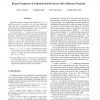Free Online Productivity Tools
i2Speak
i2Symbol
i2OCR
iTex2Img
iWeb2Print
iWeb2Shot
i2Type
iPdf2Split
iPdf2Merge
i2Bopomofo
i2Arabic
i2Style
i2Image
i2PDF
iLatex2Rtf
Sci2ools
106
Voted
FOCS
2007
IEEE
2007
IEEE
Round Complexity of Authenticated Broadcast with a Dishonest Majority
Broadcast among n parties in the presence of t ≥ n/3 malicious parties is possible only with some additional setup. The most common setup considered is the existence of a PKI and secure digital signatures, where so-called authenticated broadcast is achievable for any t < n. It is known that t + 1 rounds are necessary and sufficient for deterministic protocols achieving authenticated broadcast. Recently, however, randomized protocols running in expected constant rounds have been shown for the case of t < n/2. It has remained open whether randomization can improve the round complexity when an honest majority is not present. We address this question and show upper/lower bounds on how much randomization can help: • For t ≤ n/2 + k, we show a randomized broadcast protocol that runs in expected O(k2 ) rounds. In particular, we obtain expected constant-round protocols for t = n/2 + O(1). • On the negative side, we show that even randomized protocols require Ω(2n/(n−t)) rou...
Authenticated Broadcast | Constant-round Protocols | FOCS 2007 | So-called Authenticated Broadcast | Theoretical Computer Science |
| Added | 02 Jun 2010 |
| Updated | 02 Jun 2010 |
| Type | Conference |
| Year | 2007 |
| Where | FOCS |
| Authors | Juan A. Garay, Jonathan Katz, Chiu-Yuen Koo, Rafail Ostrovsky |
Comments (0)

